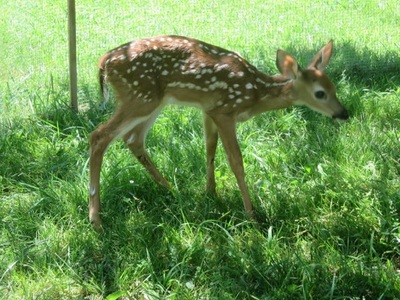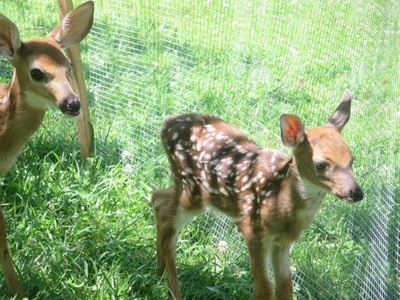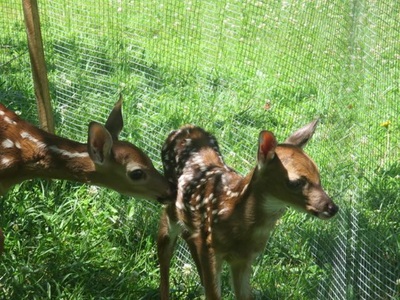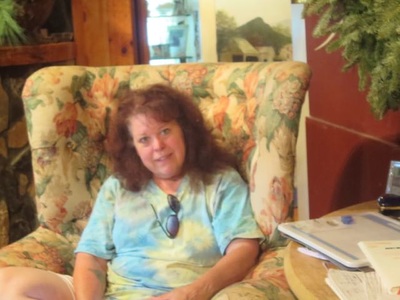|
When people hear about what Angela and Keith do, they are mostly amazed. And many offer their help. Jann Welch, who runs a charming B&B in nearby Bakersville, recently found out about the fawn rehabilitation that Angela and Keith do. She was so moved that she spoke to her guests at her B&B and actually raised about $900 to help the deer. Thank you for your kindness, Jann, and for the generosity of your guests!
0 Comments
And yet another fawn joins Angela's Deer Family! Roberta, aka Bobby, came from Candler after being picked up by a man who noticed the little one in distress. Bobby was at first very shy with the other deer, and hesitant to go up to them in the nursery. But the others welcomed the newcomer and made her feel "at home". This deer family is constantly evolving and its amazing to see how the "old" deer accept and bond with the newcomers. The older fawn groom and kiss the littler ones. Thus, a "new family" is created. When released, these are the bonds that will keep them together as a herd and will strengthen their lineage- these deer are brought in from all over Western North Carolina.
A baby deer- fawn- is completely dependent on his/her mother for the first year of life. In the wild, baby stays close to mama until mama goes foraging for food, at which time, baby is told to stay put till mom gets back- sometimes after several hours, even all day. If something were to happen to mom, then the poor baby is helpless, without food, and vulnerable to attacks by predators. For this reason, mom leaves her baby scentless by licking or eating all bodily secretions (yes, including poo and pee!), so that baby is not easy to trace. When a fawn is found in the wild and is by itself, it does NOT necessarily mean that it is orphaned! There have been so many instances of well intentioned people who find a fawn alone and think it needs help. When Angela and Keith are called, the first thing they do is to check the story of how the fawn was found. Was it hurt, did anyone see the mom, was it crying? The survival rates for a baby without mommy are slim. And if the baby is hurt, even slimmer. So, when in doubt, wait and keep an eye on the baby for at least 24 hours to determine if mom is truly not coming back. Of course, if the baby is hurt, call a professional for help! Here is a link to a website that has more detailed information on what to do when you come across a baby deer. This link also mentions the names of licensed deer rehabilitators, including Angela Weiss in Green Mountain. http://www.ncwildlife.org/injuredwildlife.aspx#5551119-is-the-animal-orphaned We all know that babies are a lot of work but the rewards are plentiful. It's a similar story with baby deer! Angela has a baby deer nursery set up in one of the bedrooms in their cabin. This is the deer nursery. She even has baby gates so that the deer will stay safe. The gates form a natural enclosure and expand as the nursery expands. Baby deer drink a lot of milk, on average about every three hours, and just like human babies, have to have it warm. This means that Angela and Keith are on a three hour feeding schedule, including the nights! Angela says sometimes she forgets to brush her teeth and comb her hair! Does that sound familiar to new moms?! Not to mention the cost of goats' milk (about $300 per week) and the occasional medical costs that injured deer incur. See this link if you would like to help. http://www.greenmountaindeerrescue.org/how-you-can-help.html Annie2 arrived next. An elderly woman on her farm kept hearing a baby deer cry, so called Keith. Keith went out and had to climb down an embankment to rescue her. She was not injured but very fearful. She is about 2 weeks old. She's been around for about 4 days now and is accustomed to her surroundings and taken to the bottle! Yay! Yesterday, a lady from Madison county called and asked if Keith and Angela were still rescuing baby deer. Keith went and picked him up and fed him immediately and brought him home This little one is three days old. It's his second day here and he's graduated from taking milk from a kitten bottle to a real baby bottle! Angela says the bottle weighs more than him! Just as Angela and I were writing this blog post, Keith came by to say he'd just received yet another call from a lady who said she's been hearing a deer cry. This deer had been hurt by a dog. So off went Keith to go on yet another rescue mission. It's busy around here! So, while we were at Angela and Keith's helping to feed the baby deer, Angela told us that Keith was on his way back home with yet another deer that had been found by a man about 25 miles away. The man had helped this injured deer and had been looking after him but was concerned that the deer was not faring well. So, he called Keith and Angela. Angela is a licensed deer rehabilatator for Green Mountain. This little deer was in bad shape but he had everyone's support! He made it through 4 nights after he was found but didn't survive. It is even sadder when a little one looks like they will make it but then don't, for whatever reason... The third day, Angela and Keith had two new babies. These came to them injured. One was hung up on a fence for hours before it was rescued. The second was one found by a man who found the mother and baby on the side of the road. The mother was dead. Both babies were taken care of on the hour by Keith and Angela but they didn't survive. The very next day, they had a phone call from a woman who was 25 miles away who had come across a baby deer- a buck- who was crying and wandering about by himself for many hours, no mommy around. The baby was named Elliot. He was then 4 days old and was and still is thriving! A baby deer is so fragile especially when mommy isn't around. |
blog AuthorsWe are the Happer's who have recently moved to Green Mountain, NC. We are neighbors and want to help Angela and Keith with their unique mission of deer rescue and rehab. If you would like to help by volunteering your time or donating please go to this link: Useful Links:
http://www.ncwildlife.org/injuredwildlife.aspx http://www.humanesociety.org/animals/resources/tips/injured_orphaned_wildlife.html Archives |




 RSS Feed
RSS Feed
